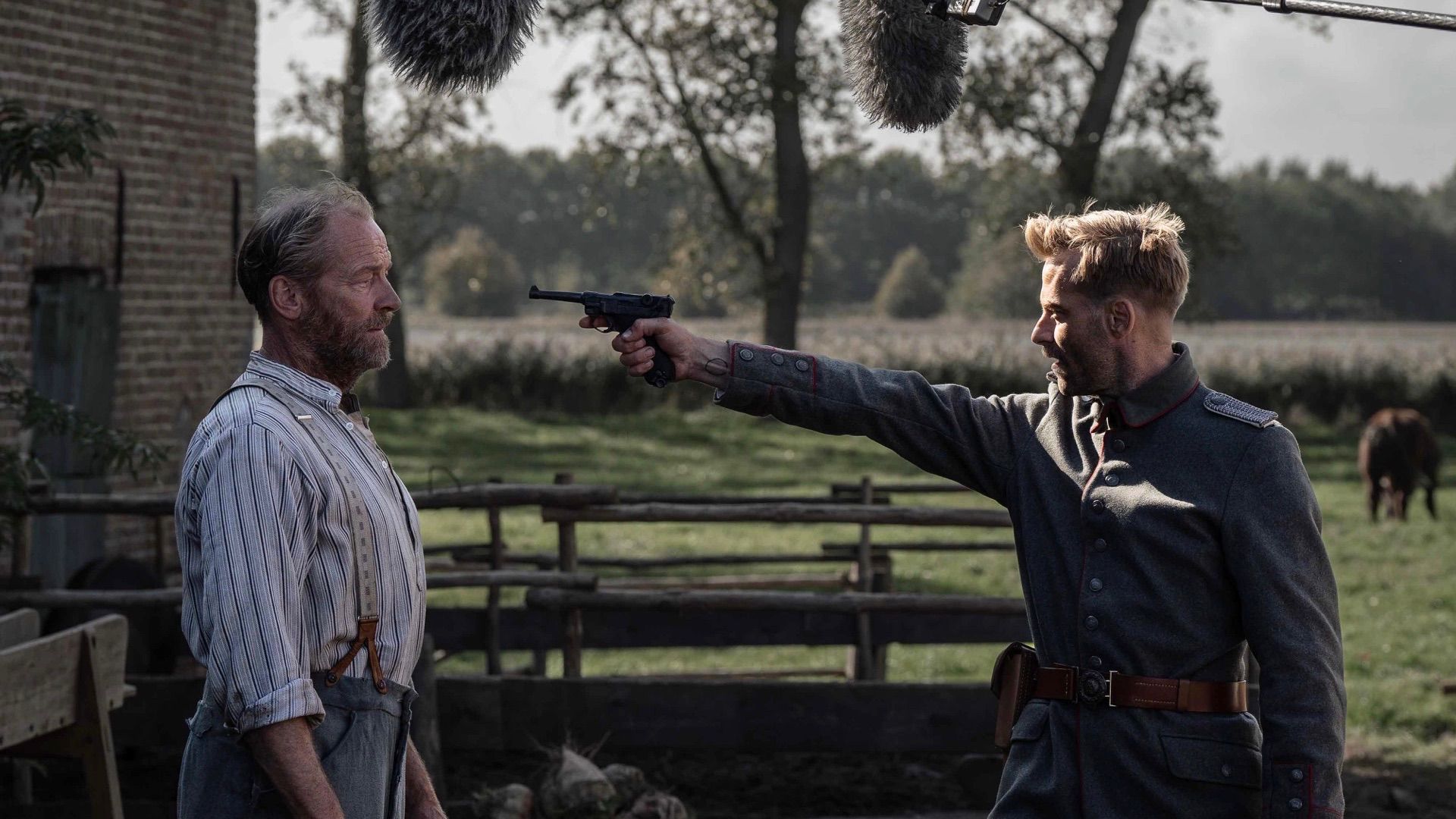A Belgian farmer fights to save his family and fellow villagers from a ruthless German soldier at the dawn of World War I. The Last Front depicts the horrifying slaughter of innocent civilians with frank realism and a poetic contrast to their gentle, bucolic lives. Director/co-writer Julien Hayet-Kerknawi channels Terrence Malick as we hear both a torn protagonist and his cruel adversary’s inner thoughts. War forces peaceful men to violence while also feeding the worst instincts of a merciless invader. The Last Front doesn’t quite succeed in every facet of its artistic intent, but is a powerfully emotional experience.
Set in Flanders, Belgium in August 1914, Commander Maximilian Von Rauch (Philippe Brenninkmeyer) leads a battalion of German soldiers towards rural villages. His son, Lt. Laurentz (Joe Anderson) sees no distinction between enemy soldiers and civilians. He executes women and children after one of his men is shot by a sniper. Rauch rebukes Rauch for such actions and a wrathful temperament. They risk turning everyone into their enemy with such callous murder.
Several miles away, Leonard Lambert (Iain Glen) sadly remembers his deceased wife (Trine Thielen). He watches as Johanna (Emma Dupont), his dutiful teenage daughter, works the fields and does laundry. Where has his son vanished? Adrien (James Downie) lies under a tree reciting poetry to a smitten Louise (Sasha Luss). The daughter of the town’s wealthy doctor (Koen De Bouw) knows both of their fathers would disapprove. Adrien doesn’t care. They’ll marry regardless.
Gentle Lives Shattered
Leonard goes to town at the bequest of Father Michael (David Calder). Everyone knows the Germans are advancing towards them. The people are frightened and will surely look to Leonard when the enemy arrives. Leonard has no interest in war. He’s got fields to harvest and an errant son to reign in. Leonard returns home to talk sense to his son and Louise. Their conversation is interrupted by Johanna’s piercing scream. A German soldier has her in his grasp.
The Last Front doesn’t initially paint every German with the same vile brush. Rauch believes in the rules of war. He’s aghast at what Laurentz has become, but doesn’t remove him from duty. A harsh verbal rebuke does nothing to stop the rampage. The drunken, belligerent Laurentz considers his father an old fool. They’re taking casualties because the locals are treacherous collaborators. Everyone is a combatant that must be pacified by any means necessary. They are less than human scum who deserve what’s coming.
Leonard, like many of the villagers, naively hopes that the Germans will make a distinction between them and the Belgian army. He could never have imagined they would be massacred like animals. The scenes are difficult to watch. Hayet-Kerknawi, who adapted the feature from his award-winning short film, pulls no punches showing the brutal pillaging of an idyllic paradise. What were once quaint streets become littered with the corpses of the terrified.
Forced to Fight
Leonard is haunted by his wife’s presence as he struggles to kill. He must fight against his personal nature to match Laurentz’ unbridled sadism. Glen, a venerated actor brimming with screen gravitas, elevates Hayet-Kerknawi’s script with gripping body language. You see him physically transformed from petrified fear to deadly purpose. This change is admittedly rousing and achieves that goal, but needs better exposition. He takes command as Father Micheal hoped he would. But the film never explains why Leonard was so respected by the villagers, when the beginning had him as someone who minded his own business. The Last Front’s second act takes a predictable path with Leonard rising to the bloody occasion.
Louise embodies the will needed by survivors to carry on from the unimaginable. A life of privilege and genuine love is shattered to pieces. Her character arc is the most engaging and truthful. Those fleeing war have to save themselves, but continue to be haunted from the loss of loved ones and horrors witnessed. Hayet-Kerknawi gives Luss a stunningly dramatic monologue near the film’s climax as she tries to hide from Laurentz’ men. How can such a beautiful day in nature be stained with the blood of such awful hate? Her words are a damning condemnation of mankind’s unquenchable taste for destruction. Luss continues to evolve as an actor with her most dramatic performance to date.
The Last Front nails the devastation of war and correctly indicts those who revel in its savagery. Leonard is the expected heroic figure in an obvious narrative, but Laurentz is the most recognizable culprit. He’s the beast unshackled and allowed to rampage in the name of victory. His father’s disappointment rings hollow when bodies are allowed to pile up. War crimes don’t happen in a vacuum. Perpetrators rain terror because they are enabled.
The Last Front is a production of Zilvermeer Productions and The Last Front BV. It is currently in limited theatrical release from Enigma Releasing. You can watch the trailer below.
